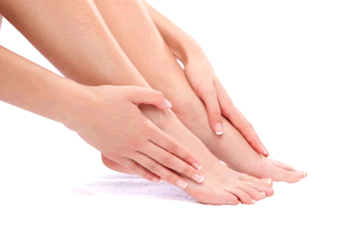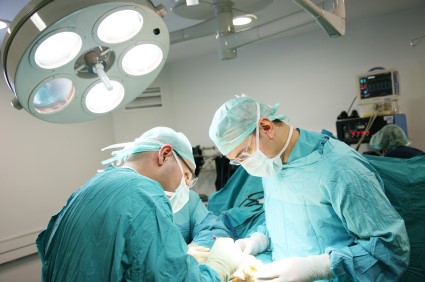Blog
Cold Plasma Developed by University Can Freeze Toenail Fungus
 A new form of cold air plasma developed by researchers at the University of California, Berkeley, can now reportedly freeze out toenail fungus. Cold plasmas can kill bacteria, remove dental plaque, loosen the connections between tissue cells, help coagulate blood and reduce bleeding. Using e. coli, researchers discovered a significant reduction in e. coli populations following the application of cold plasma; Device Farm also reported success in killing the specific fungi responsible for fungal infections. FDA approval is still required before the company can test on human patients.
A new form of cold air plasma developed by researchers at the University of California, Berkeley, can now reportedly freeze out toenail fungus. Cold plasmas can kill bacteria, remove dental plaque, loosen the connections between tissue cells, help coagulate blood and reduce bleeding. Using e. coli, researchers discovered a significant reduction in e. coli populations following the application of cold plasma; Device Farm also reported success in killing the specific fungi responsible for fungal infections. FDA approval is still required before the company can test on human patients.
While toenail fungus is troublesome to eradicate, it is not impossible. For more information about treatment, consult with Dr. Michael E. Newman of Pennsylvania. Our doctor will attend to all of your podiatric needs.
Toenail Fungus Treatment
Toenail fungus is a problem which affects many people and is hard to get rid of. Fortunately, there are several methods to go about treating toenail fungus.
Antibiotics & Treatments
Lamisil – is the most commonly effective treatment for toenail fungus. It is available as an antibiotic Terbinafine tablet and cream. Terbinafine is a chemical component which kills fungal growth on the body. Applying regular doses will gradually kill the fungal growth. It is important to keep the area clean and air free.
Talcum powder – applying powder on the feet and shoes helps keep the feet free of moisture and sweat.
Sandals or open toed shoes – wearing these will allow air movement and help keep feet dry. They also expose your feet to light, which fungus cannot tolerate. Socks with moisture wicking material also help as well
Alternative Treatments
There are always surgical procedures that are available for toenail fungus. Some people would like immediate quick removal of toenail fungus. Surgeons will be able to cut through and remove the growth using laser surgery. It is important not to try and remove it yourself. Once removed, your old shoes will need to be replaced to avoid reinfection.
If you have any questions please feel free to contact our offices located in Plymouth Meeting and Ambler, PA. We offer the newest diagnostic tools and technology to treat your foot and ankle needs.
Common Foot Changes to Women During Pregnancy
 Foot changes during pregnancy are very common, but some women do not understand why such changes occur. Size increase, arch flattening, and instability in the feet or ankles are all a result of weight gain and hormonal shifts. Normal pregnancy weight gain can change the way a woman walks, leading to instability, and fluid build-up in the lower extremities can cause the feet to grow in size. To manage these changes, compression stockings, regular walking and low-impact exercises can be used effectively.
Foot changes during pregnancy are very common, but some women do not understand why such changes occur. Size increase, arch flattening, and instability in the feet or ankles are all a result of weight gain and hormonal shifts. Normal pregnancy weight gain can change the way a woman walks, leading to instability, and fluid build-up in the lower extremities can cause the feet to grow in size. To manage these changes, compression stockings, regular walking and low-impact exercises can be used effectively.
Pregnant women are susceptible to aching and swollen feet and should be treated with care. For more information about other cures for swollen feet during pregnancy, speak to Dr. Michael E. Newman of Pennsylvania. Our doctorwill assist you with all of your foot and ankle concerns and answer any of your related questions.
What foot problems can arise during pregnancy?
One problem that can occur is over-pronation, which occurs when the arch of the foot flattens and tends to roll inward. This can cause pain and discomfort in your heels while you’re walking or even just standing up, trying to support your baby.
Another problem is edema, or swelling in the extremities. This often affects the feet during pregnancy, but tends to occur in the later stages.
How can I keep my feet healthy during pregnancy?
- Wearing orthotics can provide extra support for the feet and help distribute weight evenly
- Minimize the amount of time spent walking barefoot
- Wear shoes with good arch support
- Wear shoes that allow for good circulation to the feet
- Elevate feet if you experience swelling
- Massage your feet
- Get regular, light exercise, such as walking, to promote blood circulation to the feet
If you have any questions please contact our offices located in Plymouth Meeting and Ambler, PA. We offer the newest diagnostic and treatment technologies for all your foot and ankle needs.
Risk Factors that Increase Likelihood of Plantar Fasciitis
 While plantar fasciitis is a common condition that does not discriminate, there are certain factors that can make some people more susceptible. Those over 40 years old, are often on your feet at work, have gained weight or have lost calf muscle flexibility, may find that they are more likely to have symptoms of the condition. Although symptoms include pain when you first wake up, stand for a long time, or walk without foot supports, there are treatments available. By ensuring you have the proper foot support and regularly ice your feet, you can help reduce and prevent further inflammation.
While plantar fasciitis is a common condition that does not discriminate, there are certain factors that can make some people more susceptible. Those over 40 years old, are often on your feet at work, have gained weight or have lost calf muscle flexibility, may find that they are more likely to have symptoms of the condition. Although symptoms include pain when you first wake up, stand for a long time, or walk without foot supports, there are treatments available. By ensuring you have the proper foot support and regularly ice your feet, you can help reduce and prevent further inflammation.
Plantar fasciitis can be very painful and inconvenient. If you are experiencing heel pain or symptoms of plantar fasciitis, visit Dr. Michael E. Newman of Pennsylvania. Our doctor can treat your heel pain as well as any other foot or ankle condition.
What is Plantar Fasciitis?
Plantar fasciitis is the inflammation of a the thick band of tissue that runs along the bottom of your foot, known as the plantar fascia, and causes mild to severe heel pain.
What Causes Plantar Fasciitis?
· Excessive running
· Non-supportive shoes
· Overpronation
· Repeated stretching and tearing of the plantar fascia
How Can It Be Treated?
· Conservative measures – anti-inflammatories, ice packs, stretching exercises, physical therapy, orthotic devices
· Shockwave therapy – sound waves are sent to the affected area to facilitate healing and are usually used for chronic cases of plantar fasciitis
· Surgery – usually only used as a last resort when all else fails. The plantar fascia can be surgically detached from the heel
While very treatable, plantar fasciitis is definitely not something that should be ignored. Especially in severe cases, speaking to your doctor right away is highly recommended to avoid complications and severe heel pain. Your podiatrist can work with you to provide the appropriate treatment options tailored to your condition.
If you have any questions please contact our offices located in Plymouth Meeting and Ambler, PA. We offer the newest diagnostic and treatment technologies for all your foot and ankle needs.
New Surgical Device Means Shorter Recovery Time for Patients
 A new surgical device known as the HammerLock 2 is being used to treat hammertoes effectively and without infection. The device is made with nitinol, is inserted into the bone where it is clipped back causing the material to expand and straighten the toe. This new method allows patients to move their toes quicker where the traditional method can cause the toes to become swollen or infected.
A new surgical device known as the HammerLock 2 is being used to treat hammertoes effectively and without infection. The device is made with nitinol, is inserted into the bone where it is clipped back causing the material to expand and straighten the toe. This new method allows patients to move their toes quicker where the traditional method can cause the toes to become swollen or infected.
Hammertoes can be a painful condition to live with. If you are suffering from hammertoes, contact Dr. Michael E. Newman of Pennsylvania. Our doctor will treat your foot and ankle needs.
Hammertoe
Hammertoe is a foot deformity that affects the joints of the second, third, fourth, or fifth toes of your feet. It is a painful foot condition in which these toes curl and arch up, which can often lead to pain when wearing footwear.
Symptoms
- Pain in the affected toes
- Development of corns or calluses due to friction
- Inflammation
- Redness
- Contracture of the toes
Causes
- Genetics – people who are genetically predisposed to hammertoe are often more susceptible
- Arthritis – because arthritis affects the joints in your toes, further deformities stemming from arthritis can occur
- Trauma – direct trauma to the toes could potentially lead to hammertoe
- Ill-fitting shoes – undue pressure on the front of the toes from ill-fitting shoes can potentially lead to the development of hammertoe
Treatment
- Orthotics – custom made inserts can be used to help relieve pressure placed on the toes and therefore relieve some of the pain associated with it
- Medications – oral medications such as anti-inflammatories or NSAIDs could be used to treat the pain and inflammation hammertoes causes. Injections of corticosteroids are also sometimes used
- Surgery – in more severe cases where the hammertoes have become more rigid, foot surgery is a potential option
If you have any questions please contact our offices located in Plymouth Meeting and Ambler, PA. We offer the newest diagnostic and treatment technologies for all your foot and ankle needs.
